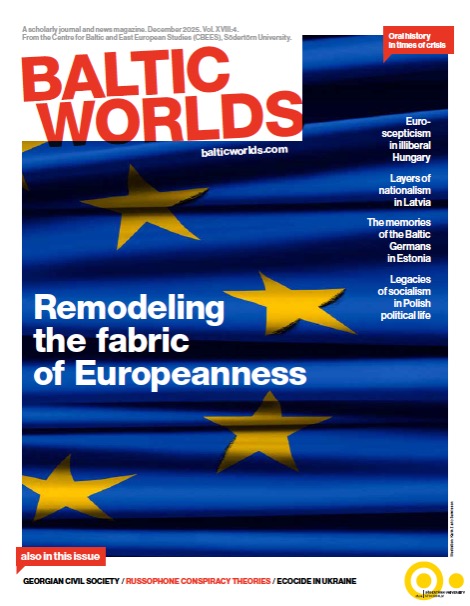The international conference “Russia Through the Eyes of Its Neighbours: The Ongoing War and Regional Security” which was held in Stockholm on September 18–19, 2025, brought together leading scholars and policy experts from across Europe, providing a platform to assess how Russia’s ongoing war against Ukraine continues to reshape the geopolitical and security landscape of the region.
By
Victoria Leukavets and Joakim Ekman
December 9, 2025
Network of Concerned Historians Annual Report 2025, contains news about the domain where history and human rights intersect, in particular about the censorship of history and the persecution of historians.
By
Ninna Mörner
September 23, 2025
arrating the Child and the Baltic Sea, the 2nd International Conference of The Graphic World of Children
Date and location: May 19–21, 2025, Södertörn Univeristy, Stockholm, Sweden.
Organizer: Lisa Källström (Södertörn University).
Advisory board: Maheen Ahmed (Ghent University), Bettina Kümmerling-Meibauer (University of Tübingen), Birgitte Beck Pristed (Aarhus University)/ The Graphic World of Children).
By
Lisa Källström
September 23, 2025
The interdisciplinary research centre Places, Identities and Memories’ (PIMs) Annual Conference “Spaces of Victimhood in Eastern Europe”
Date and location: June 18–19, 2025, the University College London (UCL).
Organizer: Jessie Barton Hronešov. and Paweł Bukowski, School of Slavonic & East European Studies (SSEES) UCL.
Memory Studies Association’s (MSA)Annual Conference “Beyond Crises:Resilience and (In)Stability”
Date: July 14–18, 2025.
Organizers: Charles University and the Czech Academy of Sciences, Prague.
By
Cagla Demirel
September 23, 2025
Conference name: Stocktaking of Research on Energy Security, Justice and Sustainability in The Baltic Sea Region and Eastern Europe: What Is Missing?
Date and location: October 24–25, 2024, Södertörn University.
Organizer: The Energy and Climate Hub at Södertörn University .
Funding: Centre for Baltic and East European Studies, Södertörn University.
By
Sara Persson et al
April 16, 2025
Conference name: Secure Horizons: Ukraine’s Peace & Infosecurity Confluence Date and location: Symposium arranged February 6, 2024, at Södertörn University/hybrid […]
By
Anastasiia Chupis and Alyona Hurkivska
April 16, 2025
This paper focuses on the notions of “time” and “temporality” of nuclear waste, as well as the different time horizons implied by practitioners of nuclear waste storage. In doing so, the paper develops understandings of a key problem defining nuclear waste storage in C21: namely, how to communicate information and memory over the 100,000 years that highly radioactive nuclear matter remains a threat to organic life. This question is notable not least because it involves the proposition of communicating with “deep time” future scenarios in which contemporary representational systems are ineffectual, and even the existence of the “human” is in doubt.
By
Thomas Keating et al
April 7, 2025
This paper takes the 2018 InGRID input note as the point of departure for an elaboration on an additional layer of governance less known among some domain-specific scholarly circles but no less relevant for their overall exploratory work of the diversity of steering and consultation mechanisms put in place by the European Union (EU) to promote integrationist dynamics and certain goals enshrined in the EU policies.
By
Zane Šime
January 20, 2025
Youth initiatives supported by the Council of the Baltic Sea States should contribute to the growing body of literature on youth engagement in the implementation of the Sustainable Development Goals. ReGeneration 2030 and the Baltic Sea Youth Platform are presented to highlight future avenues for the development of these initiatives and what research approaches would help to acquire a more structured insight not only about the hypothetical potential of these initiatives but also the delivered value-added. These findings would help the United Nations to keep apace with the mindsets of younger generations which are underrepresented among the organisation’s staff. Likewise, youth deserves to be heard due to the socio-economic challenges it faces not only in the Global South but also in the Global North.
By
Zane Šime
January 20, 2025
International Conference “Exploring the relation between antigender politics and democracy: the Baltic Sea region and beyond” held at Södertörn University on September 26–27, 2024. The conference brought together scholars, activists, and politicians to address the challenges of antigender politics in the Baltic sea region. Funded by the Foundation for Baltic and East European Studies, it was a part of a Horizon Europe project: Co-Creating Inclusive Intersectional Democratic Spaces Across Europe CCINDLE.
By
Elżbieta Korolczuk et al
December 9, 2024

 Issue 2025, 4:
Issue 2025, 4:  Baltic Worlds covers; the Baltic Sea Region, Eastern Europe, Russia, CentralAsia, Caucasus and the Balkan area.
Baltic Worlds covers; the Baltic Sea Region, Eastern Europe, Russia, CentralAsia, Caucasus and the Balkan area.